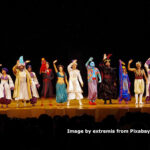Gift your characters and their worlds and their journeys of dilemma, conflict, and transformation generously.
Emphasis on transformation.
Of course well-told stories have the power to simply entertain us. But the best stories also have the power to transform by offering new vision, new insight and awareness. They wake us up. And yes that is a tall order.
I watched two films at the Regal 14 with my ten-year-old daughter this summer. Both were major studio productions with big budgets.
The first, a very recent box office hit—a save-the-universe archetypal saga—featured a reluctant, off-beat hero and his vagabond “knights”, one of whom was female, with green skin and a fighting spirit. Make no mistake, she could kick ass with the best and the worst of the guys. The film was loud, action-packed, entertaining and the same ole’, same ole’ story. My daughter loved it!
The second movie, offering equally impressive action, special effects and production values, also covers archetypal story terrain that features familiarly in fairy tales of the evil (step)mother, such as Snow White and Sleeping Beauty. But in this case, the storytellers began their tale from the viewpoint of the stepmother (specifically a fairy) instead of the princess, and, ultimately, they delivered a unique version of Sleeping Beauty with a profound and numinous twist.
(Warning: I use psychodynamic terms very clumsily in this next paragraph.)
This is a story of the fierce and nurturing feminine split off from the male and turned vengeful after violent betrayal. This “evil” stepmother begins to heal finally, tortuously, after re-embracing the feminine by opening her heart to the young princess.
In the film’s climax sequence, Beauty (the princess) is not awakened by Prince Charming’s rightfully lukewarm embrace—a kiss my daughter perceptively disqualified by proclaiming in the darkened theater, “Sheesh, you call that a kiss?”
Instead, it takes the power and fierceness of the transforming/transformative fairy’s kiss to bring Sleeping Beauty out of a death trance cast upon her by her father, the desperately jealous king. The newly awakened princess finds the courage to offer the wounded fairy an awe-inspiring gift in return. (In case you haven’t seen it, no spoiler here.)
The film is titled Maleficent—a word that holds within it the roots of both the magnificent and the malevolent. (Certainly both are rich elements of the human psyche and the characters we writers chronicle.)
My daughter loved Maleficent, too. She loved the story, the action, the magical special effects, and the dimension and potential of all of the characters for good and evil. She loved their courage to transform and awaken both themselves and their audience. And make no mistake, she registered the tragic fates of those characters who refused to—or were unable to—transform.
Guess which of these stories my daughter and I discuss again and again?
Guess which film I am truly grateful we/she saw?
I will close this post with a quote from a valued book in my library, The Matrix and Meaning of Character by Nancy J. Dougherty and Jacqueline J. West: “Visionaries and artists travel the depths of the psychic unconscious to find this wellspring, which can refresh, renew, and transform human life.”
A tall order, certainly. And a journey fraught with perils—but what story worth its salt is not?



